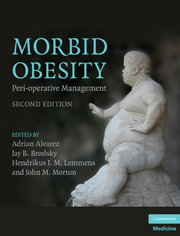Book contents
- Morbid Obesity
- Morbid Obesity
- Copyright page
- Contents
- Contributors
- Preface to the Second Edition
- Preface to the First Edition
- Abbreviations
- Section 1 Pathophysiology
- Section 2 Preparation and pre-operative evaluation/management
- 5 Choice of bariatric operation
- 6 Informed consent
- 7 Pre-operative surgical management
- 8 Pre-operative management:
- Section 3 Intra-operative management
- Section 4 Post-operative conditions
- Section 5 Special topics
- Index
6 - Informed consent
from Section 2 - Preparation and pre-operative evaluation/management
Published online by Cambridge University Press: 04 May 2010
- Morbid Obesity
- Morbid Obesity
- Copyright page
- Contents
- Contributors
- Preface to the Second Edition
- Preface to the First Edition
- Abbreviations
- Section 1 Pathophysiology
- Section 2 Preparation and pre-operative evaluation/management
- 5 Choice of bariatric operation
- 6 Informed consent
- 7 Pre-operative surgical management
- 8 Pre-operative management:
- Section 3 Intra-operative management
- Section 4 Post-operative conditions
- Section 5 Special topics
- Index
Summary
- Type
- Chapter
- Information
- Morbid ObesityPeri-operative ManagementPublisher: Cambridge University PressPrint publication year: 2010



